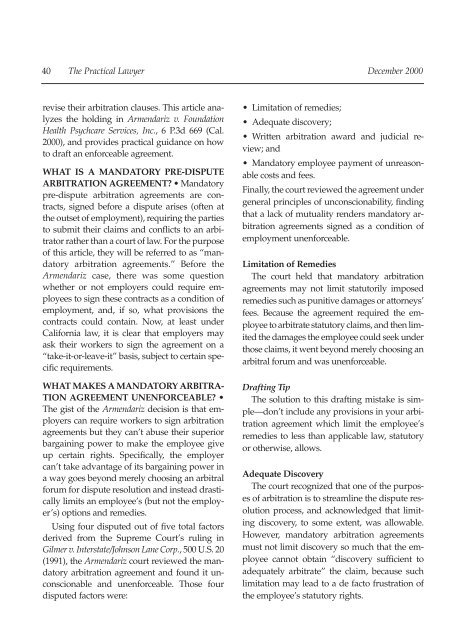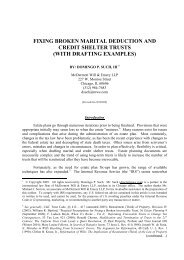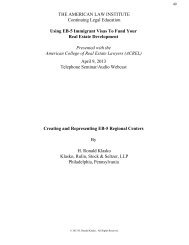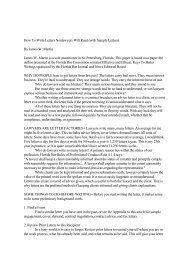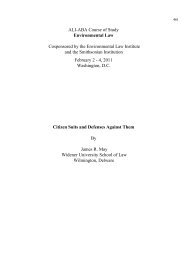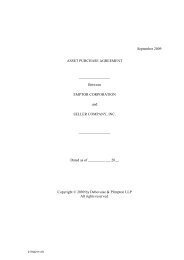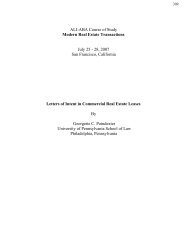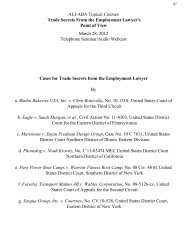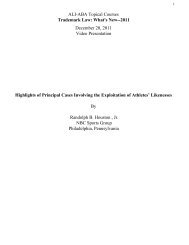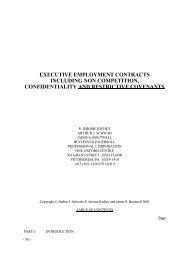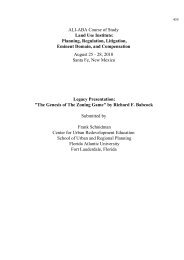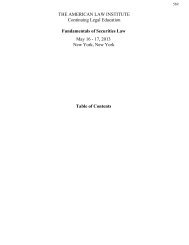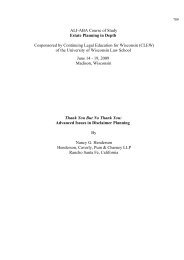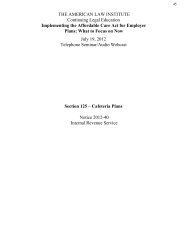Drafting an Enforceable Mandatory Arbitration Agreement ... - ALI CLE
Drafting an Enforceable Mandatory Arbitration Agreement ... - ALI CLE
Drafting an Enforceable Mandatory Arbitration Agreement ... - ALI CLE
Create successful ePaper yourself
Turn your PDF publications into a flip-book with our unique Google optimized e-Paper software.
40 The Practical Lawyer December 2000<br />
revise their arbitration clauses. This article <strong>an</strong>alyzes<br />
the holding in Armendariz v. Foundation<br />
Health Psychcare Services, Inc., 6 P.3d 669 (Cal.<br />
2000), <strong>an</strong>d provides practical guid<strong>an</strong>ce on how<br />
to draft <strong>an</strong> enforceable agreement.<br />
WHAT IS A MANDATORY PRE-DISPUTE<br />
ARBITRATION AGREEMENT • M<strong>an</strong>datory<br />
pre-dispute arbitration agreements are contracts,<br />
signed before a dispute arises (often at<br />
the outset of employment), requiring the parties<br />
to submit their claims <strong>an</strong>d conflicts to <strong>an</strong> arbitrator<br />
rather th<strong>an</strong> a court of law. For the purpose<br />
of this article, they will be referred to as “m<strong>an</strong>datory<br />
arbitration agreements.” Before the<br />
Armendariz case, there was some question<br />
whether or not employers could require employees<br />
to sign these contracts as a condition of<br />
employment, <strong>an</strong>d, if so, what provisions the<br />
contracts could contain. Now, at least under<br />
California law, it is clear that employers may<br />
ask their workers to sign the agreement on a<br />
“take-it-or-leave-it” basis, subject to certain specific<br />
requirements.<br />
WHAT MAKES A MANDATORY ARBITRA-<br />
TION AGREEMENT UNENFORCEABLE •<br />
The gist of the Armendariz decision is that employers<br />
c<strong>an</strong> require workers to sign arbitration<br />
agreements but they c<strong>an</strong>’t abuse their superior<br />
bargaining power to make the employee give<br />
up certain rights. Specifically, the employer<br />
c<strong>an</strong>’t take adv<strong>an</strong>tage of its bargaining power in<br />
a way goes beyond merely choosing <strong>an</strong> arbitral<br />
forum for dispute resolution <strong>an</strong>d instead drastically<br />
limits <strong>an</strong> employee’s (but not the employer’s)<br />
options <strong>an</strong>d remedies.<br />
Using four disputed out of five total factors<br />
derived from the Supreme Court’s ruling in<br />
Gilmer v. Interstate/Johnson L<strong>an</strong>e Corp., 500 U.S. 20<br />
(1991), the Armendariz court reviewed the m<strong>an</strong>datory<br />
arbitration agreement <strong>an</strong>d found it unconscionable<br />
<strong>an</strong>d unenforceable. Those four<br />
disputed factors were:<br />
• Limitation of remedies;<br />
• Adequate discovery;<br />
• Written arbitration award <strong>an</strong>d judicial review;<br />
<strong>an</strong>d<br />
• M<strong>an</strong>datory employee payment of unreasonable<br />
costs <strong>an</strong>d fees.<br />
Finally, the court reviewed the agreement under<br />
general principles of unconscionability, finding<br />
that a lack of mutuality renders m<strong>an</strong>datory arbitration<br />
agreements signed as a condition of<br />
employment unenforceable.<br />
Limitation of Remedies<br />
The court held that m<strong>an</strong>datory arbitration<br />
agreements may not limit statutorily imposed<br />
remedies such as punitive damages or attorneys’<br />
fees. Because the agreement required the employee<br />
to arbitrate statutory claims, <strong>an</strong>d then limited<br />
the damages the employee could seek under<br />
those claims, it went beyond merely choosing <strong>an</strong><br />
arbitral forum <strong>an</strong>d was unenforceable.<br />
<strong>Drafting</strong> Tip<br />
The solution to this drafting mistake is simple—don’t<br />
include <strong>an</strong>y provisions in your arbitration<br />
agreement which limit the employee’s<br />
remedies to less th<strong>an</strong> applicable law, statutory<br />
or otherwise, allows.<br />
Adequate Discovery<br />
The court recognized that one of the purposes<br />
of arbitration is to streamline the dispute resolution<br />
process, <strong>an</strong>d acknowledged that limiting<br />
discovery, to some extent, was allowable.<br />
However, m<strong>an</strong>datory arbitration agreements<br />
must not limit discovery so much that the employee<br />
c<strong>an</strong>not obtain “discovery sufficient to<br />
adequately arbitrate” the claim, because such<br />
limitation may lead to a de facto frustration of<br />
the employee’s statutory rights.


